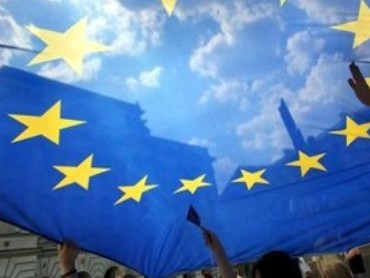Blog by Kateryna Zarembo, Deputy director of the Institute of World Policy for KyivPost.My generation cannot imagine Europe without the European Union.
When we were born, it was there – behind the Iron curtain or the Schengen wall, made up of 27 or fewer members, close or a bit farther. It’s hard to imagine that one day this organization, which is associated with welfare, quality and secure life in Ukraine, could disappear.
However, lately the idea about the threat to the EU existence keeps popping up now and again in the Western and Russian expert and media circles.
There are few reasons to worry about the EU disintegration in the near future. So far the European Union has coped with its duty to maintain peace in Europe pretty well.
On April 18, 2011 the EU marked its 60th birthday, if it is counted from the date of the creation of the European Coal and Steel Community.
The EU’s longevity exceeds that of the League of Nations, which only gave Europe 21 year of peace, but still has to beat the Vienna Congress, which resulted in 99 peaceful years.
Perhaps, the EU’s secret of success lies in the fact that, in contrast to its predecessors, it was based on the economy rather than politics and new members could join this “peace treaty”. So, the list of “peacekeepers” enlarged, not being confined to a few winners.
But there are signs that the EU is going through the evolutionary crisis. It shows in the financial problems of the EU and the “enlargement fatigue”.
So, discredited are both the economic foundation, which is the biggest strength of the EU, and its “soft power” – dissemination of the democratic values and high quality of life by means of letting in new members.
Tough conditions of Greece’s and Ireland’s loans are not as bad a signal as the fact Greece could be made to leave the Eurozone. This could become a precedent and an argument for those who think that all decision-making in the EU is done by a number of strong countries.
In its turn, the process of the EU enlargement needs a “reset”. At the moment the system is “frozen”: Brussels does not name even the date of Iceland’s accession, which is deeply integrated in the EU on the legislative and economic level, so the minimal time of pre-accession talks and national legislation adaption is required.
Seven Balkan countries and Turkey are in the line, too, with Turkey’s 24-year-long wait not being too flattering for the image of the EU enlargement.
The argument about deeper rather than wider enlargement does not prove right, too. The example is the European External Action Service (EEAS), created after the Lisbon Treaty. The institution can hardly boast to be perfectly effective.
The EU Member States attempt to create a common foreign policy was compromised at the very start, when Lady Catherine Ashton became the EEAS head.
A bureaucrat with a weak foreign policy portfolio, she immediately declared that no big foreign policy agenda could be expected from her. And this was despite the fact the even before her appointment the EU diplomats had stressed that the formation of the High Representative for Foreign Affairs and Security Policy position would depend on the personality of the first High Representative.
As a result, France and Great Britain manage the operation in Lybia, while the EEAS in general and Ms Ashton in particular run into heavy criticism from Brussels, Germany, Austria, Benelux countries and its native Great Britain.
As a matter of fact, thanks to the Lisbon treaty for the first time in the EU history the Member States determined the withdrawal procedure for the Union. So far no Member States expressed a wish to withdraw, but there was a precedent: in 1975 Great Britain held a referendum on the country’s succession from the then European Economic Community.
Famous Euro-optimist, Finnish Minister of Foreign Affair Alexander Stubb believes that the EU will cope with the existential crisis. The politician is convinced: the history of the EU is the history of crises, which the EU could always find a way to resolve.
I hope that he is right and side with his colleague, Spanish Prime Minister Jose Luis Rodriguez Zapatero: “[The EU] is not perfect but this is the best we have”.




Comments theme
Comments themeComments themeComments themeComments themeComments themeComments themeComments themeComments themeComments themeComments themeComments themeComments themeComments themeComments themeComments themeComments themeComments themeComments themeComments themeComments.